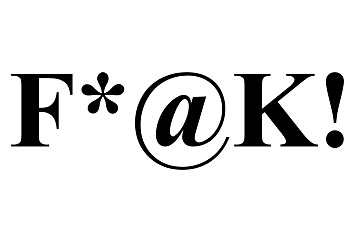
Jesse Sheidlower is the world's expert on the F word — and that's an expertise that requires more work than you might think. Sheidlower is editor at large of the Oxford English Dictionary, and his 270-page book, The F-Word, newly updated and revised, was years in the making. "There aren't that many words that you can write an entire book about, and of those, very, very few of them are ones that you would actually want to read," says Sheidlower. "There's a huge opportunity here as a scholar for something that has been a part of our language for many centuries and something that people almost uniformly think is interesting but that no one has really paid much attention to." His search for uses of the word took him from erudite scholarly archives to explicit porn sites. TIME senior reporter Andrea Sachs reached the author by phone in Seattle during his book tour.
Why is the F word so powerful that it evokes a frenzy when it's used?
What we view as offensive has changed over time and continues to change. Right now we're at a point where sexual scatological terms are considered not really that bad. They still have power but not as much as they used to even, let's say, 50 years ago. The difference is immense. In the past couple of decades, we've seen a real explosion in how widely [the F word is] being used, because people are more comfortable with it and less puritanical about it.
What was the most notorious use of the word on TV when it's either been blurted out or said intentionally?
Kenneth Tynan used it in England in a 1965 interview on a BBC talk show, and that was a tremendously prominent thing. The newspapers were outraged. He was then the director of the National Theatre. The BBC was forced to apologize, politicians attempted not only to remove Tynan from his post but to remove the head of the BBC because of it, to prosecute him for using obscene words. In America, it's been used a number of times. Last week or the week before, Saturday Night Live used it in a sketch that was actually about the use of freaking. The point of the sketch was using this euphemism, and someone actually slipped up and used the word itself.
What would you consider the most famous example in literature?
Well, probably in both Ulysses and Lady Chatterley's Lover. Norman Mailer using fug in The Naked and the Dead, which gave rise to the famous anecdote that at a party, Tallulah Bankhead — or in some versions, Dorothy Parker — came up to him and said, "So you're the young man who can't spell f___."
How would you describe the current standard in magazines and newspapers? Is there a general philosophy about it, or does it vary by publication?
It varies quite a bit by publication. The remaining serious newspapers and newsmagazines do generally shy away from using it in most circumstances. There are a very small number of cases when [publications] like TIME and Newsweek and the New York Times, the Washington Post and the L.A. Times have used it. These are very, very few and far between and only in the most serious cases when it's been very prominently used. For the most part, these magazines are not using it in actual editorial writing; it's only quoting people who've used it.
It must have intensified because of casual use on the Internet, right?
I don't really think so. The thing is, people do use this word all the time. The fact that before the Internet you weren't necessarily exposed to it doesn't mean it wasn't out there.
What psychological component goes with it?
It has an effect because it is still taboo. If it lost absolutely all of its force, well, there wouldn't be any good reason to use it that much. As long as there is still some feeling that this is a sexual term, it will maintain some power. Sometimes I'm asked, like, what's going to happen when it becomes so commonplace that it doesn't really matter anymore, and I don't think that will happen in the foreseeable future. Even as taboos against it weaken, they are still there, and it is still usually the case that you're using this informally for effect.
Do you use the word yourself?
Yes. I don't use it overwhelmingly commonly, and most of the words that are in this book I don't use. But you know I use it from time to time as necessary.
Do people expect you to use it?
I'm never sure what they expect. I am personally a relatively formal man, and I wear a suit every day. I don't know if they expect me to be some wild and crazy guy because I wrote this book, so I don't know if they see me and are surprised that I might use the word. I'm just not sure. But there's no reason why I wouldn't. It's part of our speech.
